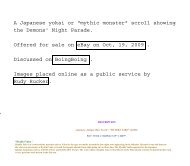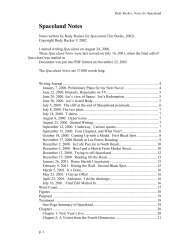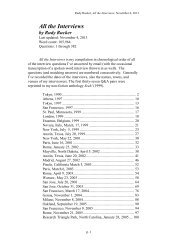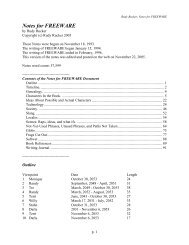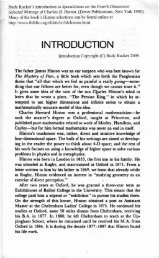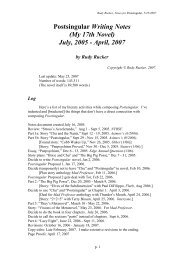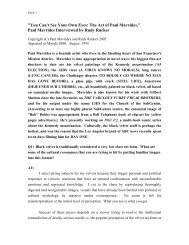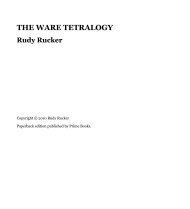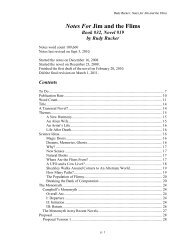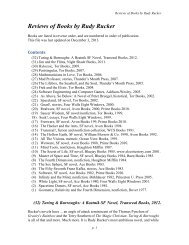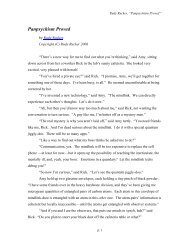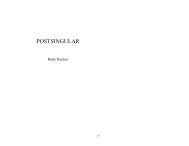Notes for the Lifebox, the Seashell, and the Soul - Rudy Rucker
Notes for the Lifebox, the Seashell, and the Soul - Rudy Rucker
Notes for the Lifebox, the Seashell, and the Soul - Rudy Rucker
Create successful ePaper yourself
Turn your PDF publications into a flip-book with our unique Google optimized e-Paper software.
<strong>Notes</strong> <strong>for</strong> The <strong>Lifebox</strong>, <strong>the</strong> <strong>Seashell</strong>, <strong>and</strong> <strong>the</strong> <strong>Soul</strong>, by <strong>Rudy</strong> <strong>Rucker</strong><br />
<strong>the</strong> memory organ can be used to store both numbers <strong>and</strong> orders.”<br />
⎯ Arthur Burks, Herman Goldstine, <strong>and</strong> John von Neumann, “Preliminary<br />
Discussion of <strong>the</strong> Logical Design of an Electronic Computing Instrument,” reprinted in John<br />
von Neumann, Collected Works, Vol. V, p. 35, Macmillan Company, New York 1963.<br />
1.1.4 Masters of Doom, Physics<br />
“...after so many years immersed in <strong>the</strong> science of graphics, he [John Carmack] had<br />
achieved an almost Zen-like underst<strong>and</strong>ing of his craft. In <strong>the</strong> shower, he would see a few<br />
bars of light on <strong>the</strong> wall <strong>and</strong> think, Hey, that’s a diffuse specular reflection from <strong>the</strong> overhead<br />
lights reflected off <strong>the</strong> faucet. Ra<strong>the</strong>r than detaching him from <strong>the</strong> natural world, this<br />
viewpoint only made him appreciate it more deeply. ‘These are things I find enchanting <strong>and</strong><br />
miraculous,’ he said, ‘I don’t have to be at <strong>the</strong> Gr<strong>and</strong> Canyon to appreciate <strong>the</strong> way <strong>the</strong> world<br />
works. I can see that in reflections of light in my bathroom.’”<br />
⎯ David Kushner, Masters of Doom, (R<strong>and</strong>om House, 2003) p. 295. Kushner is<br />
describing <strong>the</strong> programmer John Carmack, who developed most of <strong>the</strong> code <strong>for</strong> <strong>the</strong> firstperson-shooter<br />
computer games Doom <strong>and</strong> Quake.<br />
1.1.5 Hegel: Organic Growth --- or Society<br />
“For <strong>the</strong> rest it is not difficult to see that our epoch is a birth-time, <strong>and</strong> a period of<br />
transition. ... This gradual crumbling to pieces, which did not alter <strong>the</strong> general look <strong>and</strong><br />
aspect of <strong>the</strong> whole, is interrupted by <strong>the</strong> sunrise, which, in a flash <strong>and</strong> at a single stroke,<br />
brings to view <strong>the</strong> <strong>for</strong>m <strong>and</strong> structure of <strong>the</strong> new world.<br />
“But this new world is perfectly realized just as little as <strong>the</strong> new-born child; <strong>and</strong> it is<br />
essential to bear this in mind. It comes on <strong>the</strong> stage to begin with in its immediacy, in its<br />
bare generality. A building is not finished when its foundation is laid; <strong>and</strong> just as little is <strong>the</strong><br />
attainment of a general notion of a whole <strong>the</strong> whole itself. When we want to see an oak with<br />
all its vigour of trunk, its spreading branches, <strong>and</strong> mass of foliage, we are not satisfied to be<br />
shown an acorn instead. In <strong>the</strong> same way science, <strong>the</strong> crowning glory of a spiritual world, is<br />
not found complete in its initial stages. The beginning of <strong>the</strong> new spirit is <strong>the</strong> outcome of a<br />
widespread revolution in manifold <strong>for</strong>ms of spiritual culture; it is <strong>the</strong> reward which comes<br />
after a checkered <strong>and</strong> devious course of development, <strong>and</strong> after much struggle <strong>and</strong> ef<strong>for</strong>t.”<br />
Georg Hegel, The Phenomenology of Mind (1807), Harper & Row, 1967, p. 75 - 76.<br />
Outtakes<br />
Short Chapter-by-Chapter Outline<br />
(Note that this is an outdated chapter sequence that matches <strong>the</strong> initial proposal.)<br />
1. Computers have evolved gradually, almost like a new animal species. By looking at how<br />
<strong>the</strong>y do some common tasks, we discover a rigorously logical universe.<br />
2. Our machines can simulate <strong>the</strong> workings of <strong>the</strong> nature so accurately that some scientists<br />
believe <strong>the</strong> world is fundamentally a set of computations.<br />
p. 41




